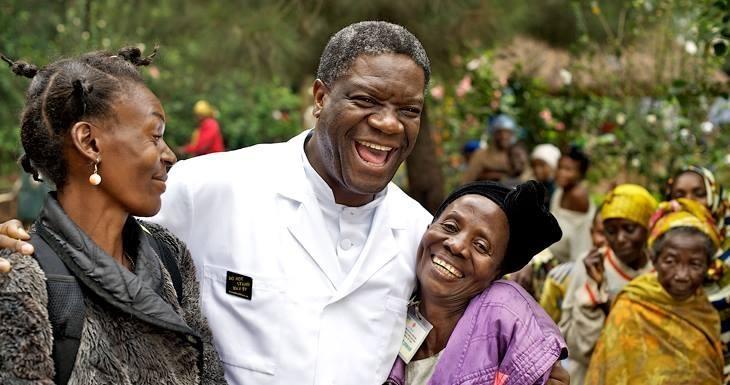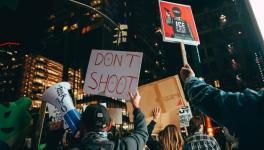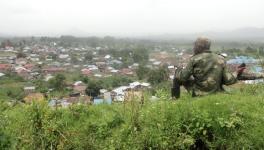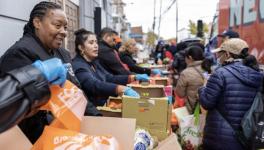Stand Up For Congo

Image Courtesy: Jewish World Watch
On January 21, after a Sunday service, Thérèse Mwanza Kapangala, a 24-year-old with dreams of becoming a nun, stepped out of the St. Francois de Sales church in Kinshasa to join a protest that was gathering steam in front the building. A short while later, she lay dead, along with five others, after Congolese security forces fired at the protest that was demanding the resignation of President Joseph Kabila.
This is the latest in a series of violent incidents to rock the Democratic Republic of Congo where simmering anger broke out into vociferous protests after Kabila's refusal to step down despite his term ending in 2016. Kabila has been in power for 17 years and has been dogged by accusations of repression, concentration of wealth and nepotism. Elections are now scheduled to be held only in December 2018.
Meanwhile, the violence continues. A few weeks ago, on New Year's eve, security forces used live ammunition, tear gas and rubber bullets on a protest called by the Lay Coordinating Committee (a group of Catholic activists and intellectuals). Even as they were kneeling down in prayer, eight persons were killed and six priests and altar boys were beaten up and arrested.
Despite these deeply traumatising events and the precarious reality of everyday life in Congo, Thérèse Kapangala decided to march. She died demonstrating her deep desire for a better Congo and a better world. After her death, Thérèse’s body was taken to the morgue. The following day, when her family went to recover her body, it had disappeared. The Kabila regime has been known to attempt to snatch the bodies of those who die In protests in order to reduce the body count. In 2015, human rights activist Christopher Ngoyi Mutamba was jailed for documenting this macabre practice.
Later, in an online video, Thérèse’s mother said, “Since they kill..they should come and kill us all…given they want power so bad.”
Congolese people are engaged in a desperate battle to create a new world beyond the extreme levels of violence imposed on their everyday lives by a despotic regime. Kabila's government has used fear and force to hold on to power. However, protests are being planned across the country. Should a critical mass of Congolese break the veil of fear, they would quickly overwhelm the regime.
The so-called international community - the United Nations, African Union, the European Union, etc – seems firmly committed to the idea of Joseph Kabila remaining in place to organise the elections. However, the Congolese people are clear that Kabila and his handpicked head of the Electoral Commission are incapable of organising free and fair elections. All the federal officials have exceeded their mandate and are illegally occupying their posts.
Drawing attention to this, Friends of the Congo Spokesperson Kambale Musavuli said, “We need to demand that along with this [Kabila stepping down], the imperialists, neo-colonialists and their African agents must also keep their hands off the Congo. The battle lines are clear; on the one hand you have the Kabila regime and the international capitalist community and on the other hand, you have the Congolese people and the working class people throughout the globe.”
“Ever since they assassinated [Patrice] Lumumba, the West has had a hand in who rules Congo. They were responsible for Kabila ascending to power and are behind the scenes orchestrating who will replace him,” said Musavuli.
The struggles by people are on the rise even as the region and Congo in particular is being brutally stripped of raw materials. Congo has become an extraction outpost for capitalists at home and abroad. Global technology, electronics, automobile and military industries are all dependent on Congo’s strategic minerals such as cobalt and coltan. In a 2008 interview with the Financial Times, the current head of the United Nations, Antonio Guterres reminded the world that, “The international community has systematically looted DRC and we should not forget that.”
Kabila and his kin have been among the biggest beneficiaries of this plunder. An article in The Guardian revealed this vast business network, “Kabila owns 71 000 hectares of farmland, both directly and with his children, while his twin sister holds a valuable stake in the state telecoms company, his younger brother has business interests that range from mining and construction to a stake in the Nando’s fast-food chain, and two family companies have diamond mining permits for 450 km of the country’s southern border.”
Our dependence on these everyday items means we are all entangled in the Congo crisis and the suffering of the Congolese people. The recent mining indaba (conference) that took place in South Africa where discussions around the Congo’s cobalt took centre stage, is an important reminder of the centrality of the Congo to key global industries.
Despite the global use of raw materials from the Congo, international bodies have remained weak and ineffective, while ordinary Congolese people pay the price of these products in the currencies of death, hunger, unemployment and abject poverty. The loud silence of the African Union has demonstrated its alliance with the massive mining conglomerates and multinational corporations and the Kabila regime.
“We are hungry, we have no jobs and we cannot afford schools. The leaders have sold the country while the people are tired and are suffering. We will not stop, we will continue to march for our rights,’ said Jean-Marie Kalonji, the national coordinator of radical youth movement Quatriemme Voie.
In Johannesburg, South Africa, on January 18, 2018, many Congolese people demonstrated in Yeoville in support of the Catholic Church, Archbishop Laurent Monsengwo Pasinya and the Congolese people killed during the New Year’s eve demonstrations. The Archbishop famously claimed that, “the Congo was like an open air prison.”
Across the world in Lima, Peru, the Pope made a direct appeal to the authorities of Congo to act within the public good. He called on people to pray for the relevant authorities and responsible persons to put their greatest effort towards avoiding all forms of violence and to rather look for peaceful solutions. The moral weight of this appeal cannot be denied considering the potential of the Church, as an organised structure, to mobilize.
Other communities too have joined the resistance. Cheikh Ali Mwinyi N’kuum, a representative of the Islamic Community of the Congo, called for the constitutional rights of the marchers to be respected. Father Francois David Ekofo, the president of the Protestant Church of Christ in the Congo, delivered a searing critique in a speech on January 16, pointing out that it was a sin that despite all the riches of the Congo, the people still live in poverty. He has since fled the country and is living in exile in the United States.
A highlight of the resistance has been the youth-centred Telema (a word in the Lingala language that means Stand up) movement that has sought to mobilise youth against the attempts of the Kabila government to stay on in power. The sacrifices of Grace and the youth who lost their lives after the Telema movement affirm the dignity of all those who strive for peace, justice and human freedom.
The Democratic Republic of Congo and its wealth can be saved and restored to its people, who are largely the unemployed and the rural poor. It is time for these sectors of society to unite and organise themselves and take their country back. As for the world working class, the time has come to stand up in support of the common people of the Democratic Republic of Congo.
Disclaimer: The views expressed here are the author's personal views, and do not necessarily represent the views of Newsclick.
Get the latest reports & analysis with people's perspective on Protests, movements & deep analytical videos, discussions of the current affairs in your Telegram app. Subscribe to NewsClick's Telegram channel & get Real-Time updates on stories, as they get published on our website.























